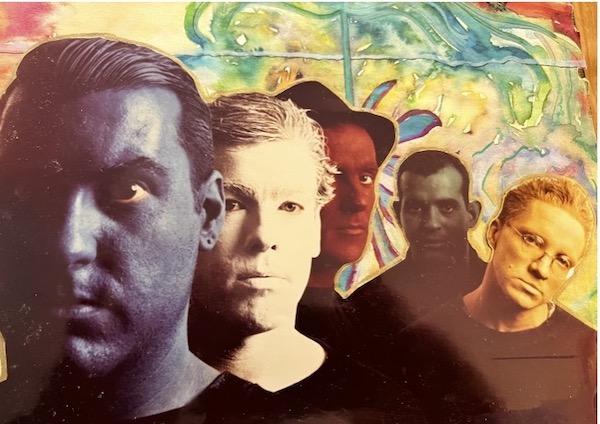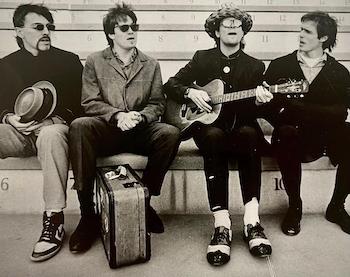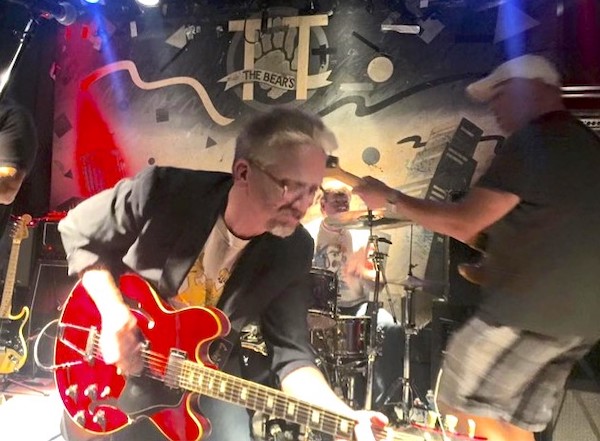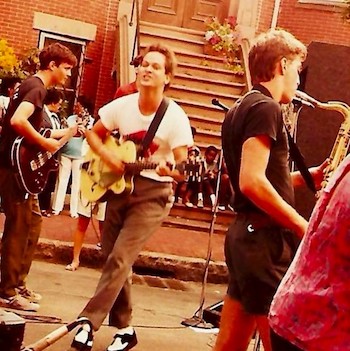Concert Preview: O Positive and Three Colors — Together Again with Purpose
By Paul Robicheau
O Positive and Three Colors will reunite at the Paradise Rock Club this Friday for “With a Little Help from My Friends: A Benefit Concert for a Friend in Need.”

O Positive. Photo: courtesy of the artist
Friendships last decades in the Boston music community, and that includes Dave Herlihy and Chris Harford. Forty years ago, when garage rock dominated the city’s rock scene, the respective singer/guitarist/songwriters of O Positive and Three Colors found personal and musical kinship amid the more polished, eclectic palettes of their bands, which both issued debut records in 1985.
O Positive earned college radio and MTV exposure for “With You,” a track from Only Breathing that juxtaposed dreamy textures and tumbling rhythms under emotive vocals. The band graduated to a major label, but after scoring other favorites like “Talk About Love,” “Up, Up, Up” and “Imagine That,” O Positive broke up in 1995.
Three Colors formed at Connecticut College in New London before moving to Boston and adding saxophonist Dana Colley, later of Morphine. They forged a sparse, danceable blend of art rock and ska, releasing a sole eponymous EP (including “One Big Tree” and “Bowling Ball”) before imploding in 1988.
The two bands shared lots of bills at local clubs back in the day. “Everybody was huddled around the same campfire,” Herlihy says. “We played all over the place, and after shows we would hang out until like five in the morning in someone’s apartment, just playing Beatles songs and smoking joints.”
It’s been a decade since O Positive and Three Colors last performed. In 2013, they again shared a stage for T.T. the Bear’s 40th anniversary celebration, and O Positive also played the 25th anniversary of WMBR’s Pipeline a year later.

Three Colors back in the day. Photo: Courtesy of the artist
But both groups will reunite at the Paradise Rock Club this Friday, January 19, for “With a Little Help from My Friends: a Benefit Concert for a Friend in Need.” The friend is Caryn Sowa, a longtime O Positive supporter who’s worked in managerial roles at Boston’s major theater and concert venues (as does husband Ted) and is battling brain cancer.
“We’re banding together to raise money to support her and her family in this difficult time,” Herlihy says. “We’ll sing and dance and hold each other tight.”
Like O Positive, Three Colors didn’t intend to reunite until the benefit came up, Harford says during a joint Zoom call with Herlihy. “When you asked us to do this, and you told us about your friend, it was a no-brainer … there’s a higher purpose here.”
The camaraderie between Herlihy and Harford is evident as they reminisce about their bands, influences, and the scene they were all part of in the ’80s. They recall how Herlihy joined Three Colors onstage for a song at the T.T.’s anniversary and how they might similarly collaborate at the Paradise show. Herlihy mused about trying to co-write a song with Harford at some point.
“We talk probably once a decade,” Harford says, to which Herlihy counters, “We made up for it this past couple of years.” Harford responds, “It’s the aging process. ‘Oh shit, let’s connect with people who have meaning in our lives!’”

O Positive live at T.T. the Bear’s. Photo: courtesy of the artist
After Three Colors ended, Harford decamped to his home state of New Jersey, where he remains as busy as ever. His projects include his aptly named Band of Changes, dub endeavor Blanc du Blanc (involving Colley and drummer Joe Russo), Birdfeeder (with Dumptruck’s Kevin Salem and Miracle Legion’s Mark Mulcahy) and Rogue Oliphant. That all-star unit includes former Del Fuegos guitarist and biographer Warren Zanes and Pogues bassist Cait O’Riordan, putting music to leader Paul Muldoon’s poetry, with a record in the works produced by Tony Visconti of David Bowie fame.
After resurrecting Three Colors’ Soul Selects label, Harford is also working to assemble a retrospective of the band with help from singer/bassist/songwriter Hub Moore, who lives in Brooklyn. Keyboardist brother Max Moore — like Colley — still makes Boston his home. For the Paradise benefit, the group will be rounded out by Miracle Legion drummer Jeff Weidershall, who played the T.T.’s show.
Herlihy, a practicing lawyer who’s now a Northeastern professor coordinating its music industry program, maintained close connections with his O Positive bandmates. Bassist Dave Ingham, guitarist/singer Dave Martin, and drummer Ken Hickey have joined him in various band outings, one fittingly called Hey Dave. Herlihy recently released a solo album, Postcards from Kindergarten, Vol. 1, and contributed vocals to O Positive lead guitarist Alan Petitti’s new solo debut Square One.
It wouldn’t be O Positive without Petitti, back for the Paradise reunion as what the group calls its “sonic sorcerer.” Herlihy describes Petitti’s contributions as “kind of vast, and we haven’t played together for 10 years, so there’s a certain amount of revving the engines.”

Three Colors live on the street. Photo: courtesy of the artist
When O Positive began in 1983, Petitti was “a real architect of the rhythm section,” Herlihy says. “He had a real angular sense of what he wanted.” The band took cues from R.E.M. and British acts like the Cure, XTC, and especially Echo and the Bunnymen, Herlihy influenced by what he heard as a WZBC DJ. “We were going to be too well-produced for college radio and too weird for commercial radio,” he says. “I kind of thought we were straddling the wrong side of both.”
Three Colors, in turn, was influenced by O Positive and Boston predecessors Mission of Burma and Limbo Race as well as XTC and Miracle Legion before developing its own sound. “We devoured all these styles,” Harford says, noting how Hub Moore and he bonded over their love for ska group the Specials (one of Three Colors’ first big gigs was opening for the English Beat at the Channel) and had an epiphany about the power of songwriting when they heard Hank Williams on the radio on their way to South by Southwest in Austin, Texas.
The Boston scene was humming in the ’80s. “At least there was a map — now there’s no map really,” Herlihy says. Everyone made a demo, got on the radio, earned press in papers like the Boston Phoenix and Globe, and played clubs.
“The only game in town was being in a band — it was the way that culture connected,” he says. “You’d go to see these people who are doing songs you love. There was no other dimension that pulls people together like live music.”
And that feeling will be resurrected at the Paradise benefit. “You do what you can, which is to make music,” Herlihy says. “Just to be able to do something, this is going to be a highlight of my life.”
Paul Robicheau served more than 20 years as contributing editor for music at the Improper Bostonian in addition to writing and photography for the Boston Globe, Rolling Stone, and many other publications. He was also the founding arts editor of Boston Metro.
Tagged: Alan Petitti, Chris Harford., Dave Herlihy, Jeff Weidershall, O Positive, garage rock
